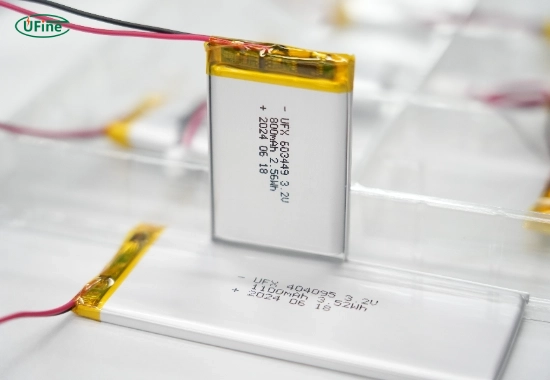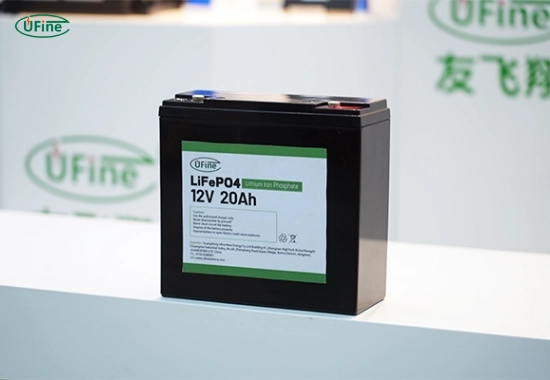In recent years, battery technology has seen significant advancements, with lithium-based batteries emerging as one of the most efficient and widely used options. Lithium iron phosphate (LiFePO4) and lithium phosphate batteries are often used interchangeably. But are they the same thing? What sets them apart, and how do their features impact performance, safety, and longevity?
This article explores the differences between lithium iron phosphate and lithium phosphate batteries, shedding light on their unique characteristics and which might be the best choice for your needs.
Part 1. What is a lithium iron phosphate battery?
Before diving into the comparison, it’s essential to understand lithium iron phosphate (LiFePO4). A lithium iron phosphate battery is a type of lithium-ion battery that uses iron phosphate (FePO4) as the cathode material. This chemistry makes it different from traditional lithium-ion batteries that often use materials like cobalt or manganese.
LiFePO4 batteries are popular for their high thermal stability, long lifespan, and enhanced safety. They are commonly used in applications such as electric vehicles (EVs), solar energy storage, and power tools.
Key Features of Lithium Iron Phosphate Batteries:
- Longer Lifespan: LiFePO4 batteries can last between 2,000 to 5,000 charge cycles.
- Safety: They are less prone to overheating or catching fire compared to other lithium-ion batteries.
- Stable Performance: These batteries maintain performance over a wide range of temperatures.
- Eco-friendly: They contain no toxic heavy metals like cobalt, making them a more environmentally friendly option.
Artikel Terkait: What is a LiFePO4 Battery?
Part 2. What is a lithium phosphate battery?
While lithium phosphate batteries may seem similar, they are technically a broader category. A lithium phosphate battery typically refers to any lithium-based battery that uses phosphate compounds in its chemistry, with lithium iron phosphate (LiFePO4) being one of the most common variants.
In other words, lithium phosphate is a general term for lithium and phosphate batteries. In contrast, lithium iron phosphate refers explicitly to using iron as part of the cathode material.
Key Features of Lithium Phosphate Batteries:
- Versatility: Lithium phosphate batteries can come in chemical formulations beyond iron phosphate.
- Safe Chemistry: Like LiFePO4, lithium phosphate batteries are generally safe and stable compared to other lithium-ion types.
- High Efficiency: They deliver good efficiency for various applications, including grid storage and medical devices.
Part 3. Lithium iron phosphate vs lithium phosphate: Chemical differences
The chemistry is the primary difference between lithium iron phosphate and lithium phosphate. LiFePO4 batteries use iron as the cathode material. At the same time, lithium phosphate can refer to any battery that uses phosphate as the core component of its chemistry.
This subtle distinction can lead to differences in performance characteristics, with LiFePO4 batteries often being more efficient, safer, and longer-lasting than other lithium phosphate variants.
Part 4. Performance: Lithium iron phosphate vs lithium phosphate efficiency
Efficiency of Lithium Iron Phosphate Batteries
Lithium iron phosphate (LiFePO4) batteries excel in providing high energy density and efficiency. They offer a more stable voltage output, meaning less energy is lost during the charging and discharging.
While also efficient, lithium phosphate batteries may not perform at the same level as LiFePO4 batteries in terms of energy density and consistent performance over time. However, they still provide solid efficiency for many applications.
Longevity and Durability
One of the strongest points of LiFePO4 batteries is their long lifespan. While lithium phosphate batteries can last a reasonable amount of time, LiFePO4 outperforms them due to its chemical stability.
LiFePO4 batteries can last between 2,000 and 5,000 charge cycles, while other lithium phosphate variants may have a slightly shorter lifespan.
Part 5. Safety: Which is safer — lithium iron phosphate or lithium phosphate?
Both lithium iron phosphate (LiFePO4) and lithium phosphate batteries are generally safer than many other lithium-ion batteries because they are less prone to overheating or catching fire.
Lithium Iron Phosphate Safety
LiFePO4 batteries are mainly known for their robust thermal stability. They are highly resistant to thermal runaway, where the battery overheats and can potentially catch fire or explode. This makes them an excellent choice for applications where safety is a priority.
Lithium Phosphate Safety
Although lithium phosphate batteries are also relatively safe, their performance can vary depending on the specific chemistry used. If the cathode material is not iron-based, there may be a slightly higher risk of thermal instability under extreme conditions.
Part 6. Cost Comparison: Lithium Iron Phosphate vs Lithium Phosphate
Regarding cost, lithium iron phosphate (LiFePO4) batteries tend to be more expensive than general lithium phosphate batteries due to the iron phosphate chemistry and the longer lifespan they offer.
However, the investment is often worth it for those who need a durable and long-lasting solution, especially in applications like electric vehicles or solar power storage.
Part 7. Applications: Where are lithium iron phosphate and lithium phosphate used?
Lithium Iron Phosphate Applications
- Electric vehicles (EVs)
- Solar energy storage systems
- Portable power stations
- Power tools
Lithium Phosphate Applications
- Grid storage
- Medical devices
- Consumer electronics
- Backup power systems
Part 8. Charging Speed: Lithium Iron Phosphate vs Lithium Phosphate
Both types generally perform well when comparing the charging speed of lithium iron phosphate (LiFePO4) and lithium phosphate batteries. However, LiFePO4 batteries tend to have faster charging times, an advantage in many high-demand applications, such as electric vehicles or portable power banks.
Part 9. Environmental Impact: Lithium Iron Phosphate vs Lithium Phosphate
One significant benefit of lithium iron phosphate and lithium phosphate batteries is their low environmental impact compared to other types of batteries. They are generally recyclable and do not contain harmful materials such as cobalt or nickel, making them a better choice for sustainability.
LiFePO4 is especially considered eco-friendly because it uses iron rather than other resource-demanding materials.
Part 10. Choosing the correct battery: Lithium iron phosphate vs lithium phosphate
Choosing between a lithium iron phosphate and a lithium phosphate battery largely depends on your needs. Suppose you’re looking for a long-lasting, safe, high-performance battery for high-drain applications like electric vehicles or solar power storage. In that case, a LiFePO4 battery is likely the better choice.
On the other hand, a lithium phosphate battery may suffice if you’re looking for a cost-effective solution for lower-drain applications, such as backup power systems or medical devices.
Part 11. FAQs
-
What is the main difference between lithium iron phosphate and lithium phosphate?
The key difference lies in the cathode material. Lithium iron phosphate specifically uses iron phosphate (LiFePO4), while lithium phosphate is a broader term for any battery using phosphate compounds. -
Are lithium iron phosphate batteries safer than lithium phosphate batteries?
Lithium iron phosphate (LiFePO4) batteries are generally safer due to their better thermal stability and resistance to thermal runaway. -
Which lasts longer, lithium iron phosphate or lithium phosphate batteries?
Lithium iron phosphate batteries typically last longer, offering between 2,000 and 5,000 charge cycles. In contrast, lithium phosphate batteries have a slightly shorter lifespan. -
Are lithium-iron phosphate batteries more expensive?
Due to their advanced chemistry and longer lifespan, LiFePO4 batteries are more expensive than general lithium phosphate batteries. -
Can I use lithium iron phosphate batteries in an electric vehicle?
Lithium iron phosphate (LiFePO4) batteries are commonly used in electric vehicles (EVs) due to their high efficiency and long lifespan.
Related Tags:
More Articles

How to Choose the Best Floor Scrubber Battery for Commercial Cleaning?
Selecting the ideal floor scrubber battery ensures a long runtime, rapid charging, and minimal maintenance for efficient commercial cleaning operations.
Battery for Blower vs Battery for Leaf Vacuum: Which One Should You Choose?
Battery for blower vs leaf vacuum—learn the key differences in power, fit, and runtime to choose the right battery for your outdoor tool needs.
How to Choose the Right Battery for Blower?
Choosing the right blower battery? Consider voltage, capacity, chemistry & usage. This guide helps match the best battery for peak performance.
How to Choose the Best Insulated Battery Box for Lithium Batteries?
Choosing the Best Insulated Battery Box for Lithium Batteries? Discover key factors such as size, material, and safety for optimal protection and performance.
7 Critical Elements on a Lithium Battery Shipping Label
What must be on a lithium battery shipping label? Learn 7 key elements to ensure safety, legal compliance, and correct handling across all transport modes.





